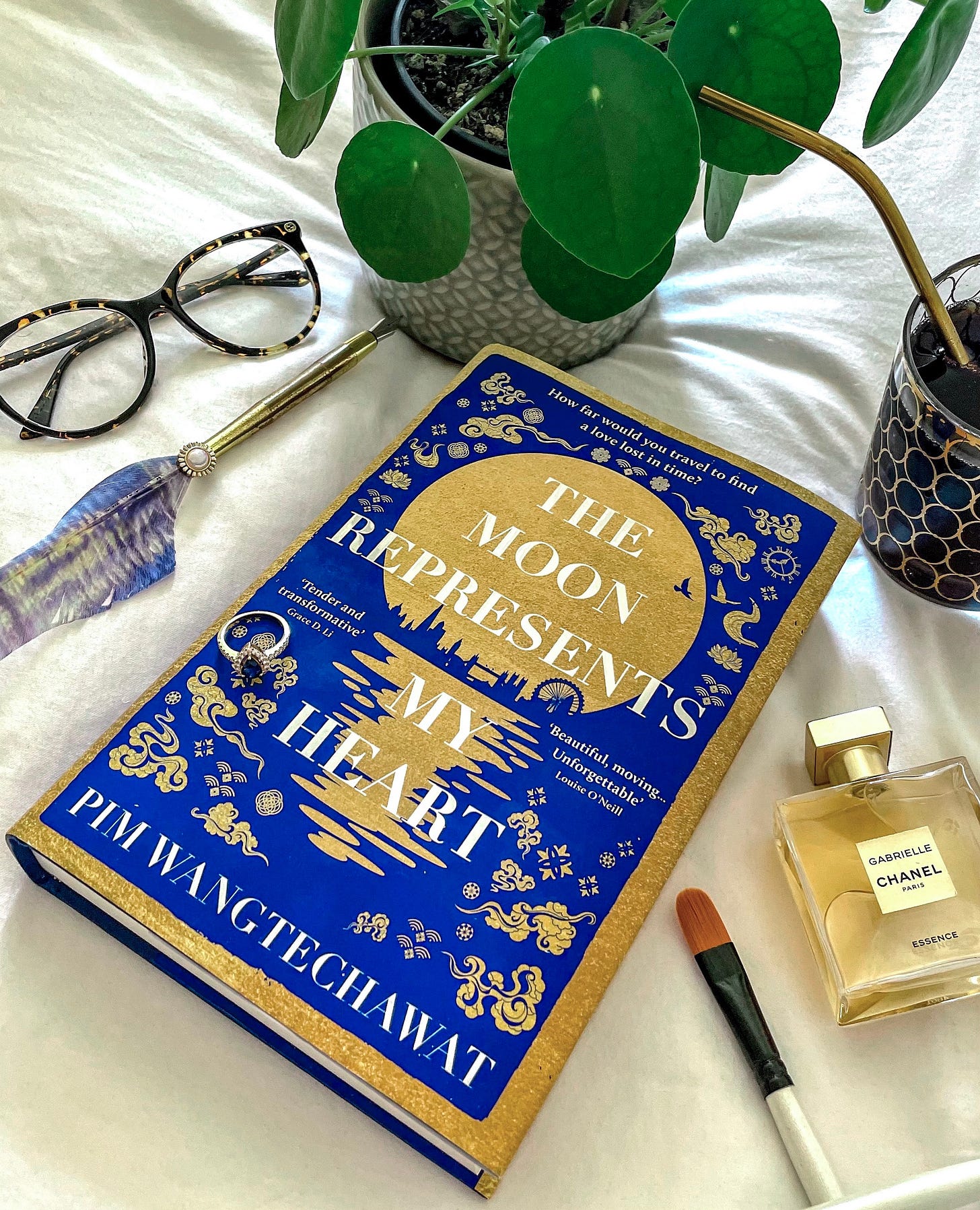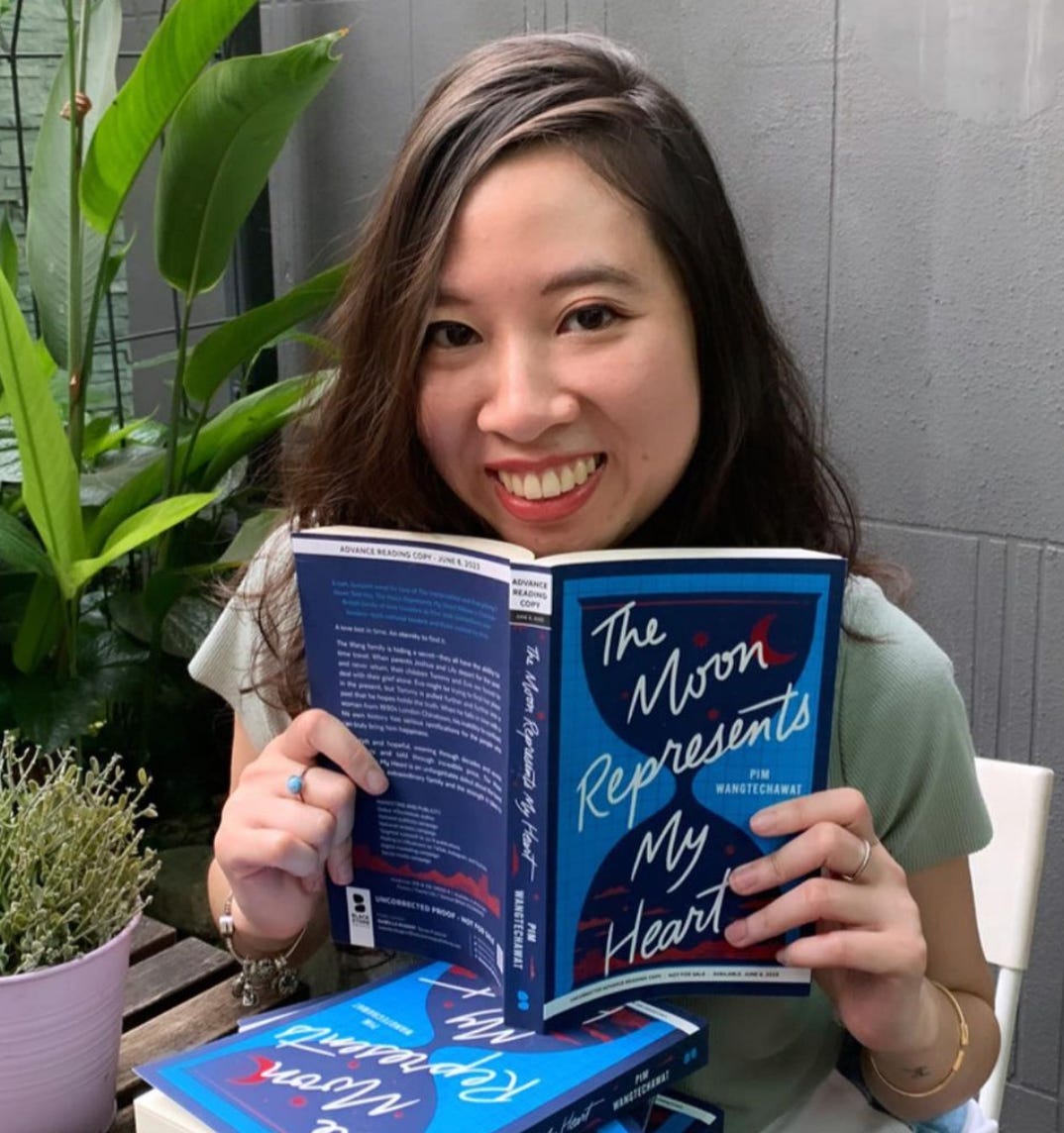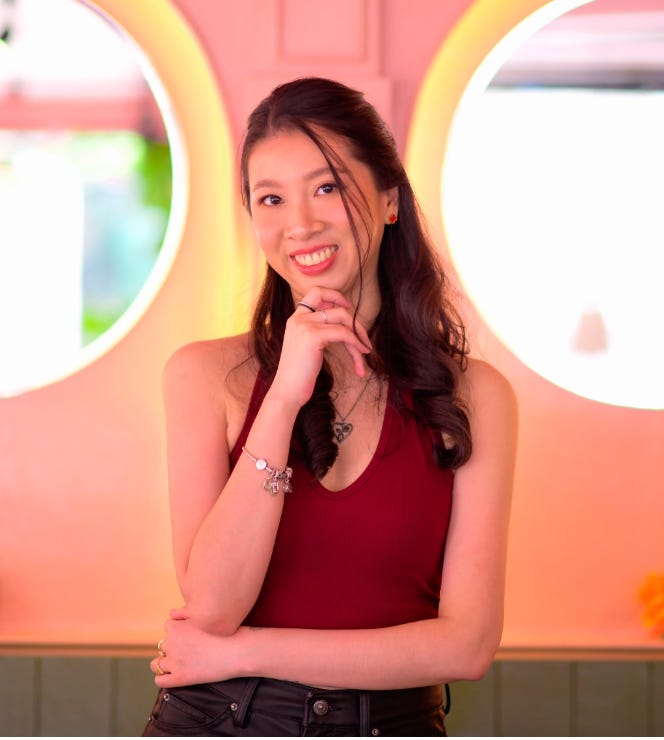Pim Wangtechawat is the author of The Moon Represents My Heart, a gently powerful story about family, love, loss, and time travel. My review for this book can be found on my Instagram @imogens.corner.
I: Congratulations on the publication of your debut novel, The Moon Represents My Heart. What has been the most surprising part of the publishing process so far?
P: I know this seems like an obvious answer, but it’s the fact that people can finally read the book. It’s been just mine for so long and I've been focused on it for so long, so it’s strange! Maybe it's not surprising because I knew it was going to be published, but it's still a surreal experience.
Also, I think it’s probably surprising how anticlimactic the process is; you think that release day is going to be a big thing, but it flies by. I've wanted to be an author since I was young, too, so I was surprised by this. I was talking to Elvin [Mensah, author of Small Joys] about this: it’s not anticlimactic in a bad way, but it was confusing.
I: My favourite thing about TMRMH is the loving, complicated relationships between the entire family. How did you go about navigating these connections and creating such a tangible family dynamic?
P: I’m very interested in human connections, emotions, and relationships in general, so I wanted to put a lot of focus on those dynamics. It helps that I’m an observant person for this, too. A lot of the book is based on my own family history, so I definitely use that and try to portray it in a way that will make sense to other people.
I: Some of the characters in your book - such as Tommy and Carol - make difficult, frustrating decisions at times, but your ability to help the reader empathise with their mindset is incredible. Were you worried that readers would struggle to love these characters in the same way as some of the more obviously sympathetic ones?
P: I know that some people still don’t like Tommy, so I’m glad you found them sympathetic. You’re also the only person who has messaged me about Carol!
I think it's very easy for ‘mainstream’ fiction to have very likeable characters so that people root for them, but I find that unrealistic. It can actually strip away the nuance and the layers and the complexities that make us all human beings. What I was trying to do when I wrote Carol was to have her make decisions that readers might not necessarily agree with or understand, but I wanted to show the reader why she was making these decisions and what actually informed them.
With these characters, they have their own struggles or their own insecurities that have led them to making these choices. When they do, readers might not agree with those choices, but they would hopefully be able to understand and empathise with them. Even if they aren’t rooting for these characters, they should be able to see that their hearts are usually in the right place.
I: Your approach to form and structure in this book is very creative, especially in Eva’s chapters. Could you give me some insight into how you brought Eva’s artistic mind to life on the page?
P: This book definitely has a lot of poetry-style form in it. A lot of what really inspired me for this was a memoir called The Terrible by a poet called Yrsa Daley-Ward. It’s written in such experimental prose and I found it mind-blowing. You would usually associate that form with poetry, but she’s just telling her story with it. It really opened my mind to what you can do with rhythm and flow, and how that affects the reader’s experience.
Because so much of this book is about time and memories and the dream-like state that you end up in when you're dealing with loss or grief, I wanted to try that. The form is an attempt to capture that fuzzy, flowing state where things bleed together and you’re not really sure what’s real.
With Eva, I imagined her as such a creative character and I think how she would express herself is different to the typical paragraph structure. Instead, her chapters are written how she would paint, but in literary form.
I: A really interesting discussion about class and the intersectionality of ‘othering’ arises when Lily and Joshua interact with Lily’s university friends in a Chinese restaurant. Having read some of your past articles about Asian representation in TV and film, was it important to you to highlight these differences in how setting and circumstance can impact the perception of Asian characters?
P: That’s a great question! I couldn’t possibly write a book that encompasses the entire Asian experience, but I did want to touch on a few situations that I have experienced. Class plays a big part in both Asian and British society, and it also links to racism and prejudice in a way that not many people talk about. In relation to this, I wanted to highlight the differences in Joshua and Lily’s backgrounds.
A lot of people of colour are brought up in societies that see whiteness as the standard or something to aspire to. People often mistake wealth or class for moving up in the world, a sort of gateway to that whiteness, and I think that sometimes white people see people of colour as ‘not like other POCs’ when they have money. It’s quite a small moment in the story, but it’s something that I definitely wanted to touch on when writing this book.
I: With a series already being produced by the incredible Gemma Chan for your book, what are you most excited to see play out on screen? Do you have any creative involvement and is it strange trusting your literary baby in the hands of other people?
P: It is only in development and has a long way to go, but I’m very excited by the idea of it, especially because everyone at the production company has been so lovely. I do have an executive producer credit, so I am involved and can give feedback on their ideas. You know that I love TV and film, so I’m fascinated by the whole process.
It’s definitely weird to see something you’ve written and that is so personal to you being adapted, but you have to separate them in your head: this is the book and this is the show. Things might change or get added or new storylines might appear, but I want to stay true to the spirit of my book. I want to keep the heart of my story alive and I think that’s important to the production team, too.
I: If you discovered your own secret time-travelling ability, where and when would you go first?
P: I’m a huge history nerd, so I think part of me would like to travel where Tommy goes and be able to see what it was like in Chinatown and the East End during the war. I know that it would be dangerous and grim, but I would be interested in the history.
If not, I’d like to go to the mediaeval period to see knights riding on horses and things like that.
I: Are there any future novels in progress right now?
P: Yep! I have a two-book deal, so I am working on book two right now. The first draft is done and I’m in the process of editing it. It was supposed to be a love story, but… we’ll see.
I: What does creativity mean to you?
P: It’s taking the feelings and emotions and experiences that mean a lot to me or are too heavy to carry, and then finding a way to turn them into something beautiful or something that can help people connect with each other.
I: Are there any writers or other individuals that have particularly inspired your work?
P: Elvin James Mensah - the author of Small Joys - is definitely an inspiration to me, especially in his character ‘Muddy’. He writes such lovely characters and I think I might be too pessimistic to do that, but I love them so much! His writing is so precise too, which I find really impressive as mine tends to be more about the vibes.
Another is Madeline Miller. Circe is one of my favourite books, and also Celeste Ng because I loved Everything I Never Told You. I’m also inspired by a lot of poets and rappers, especially Kendrick Lamar.
I know that you’re a fan of Taylor Swift and her folklore and evermore albums came out when I was writing this book, so I listened to those a lot whilst I was writing.
I: What are you reading at the moment?
P: I like to read a lot when I’m writing. It keeps me inspired. I’ve recently read and loved both Crying in H Mart by Michelle Zauner and Yellowface by R. F. Kuang. I’m also really looking forward to reading Portrait of a Thief by Grace D. Li, which is a young adult novel about a group of Asian American teenagers pulling off a heist.





Another great interview Imogen, enjoyed reading this and learning about this author’s fascinating viewpoint.